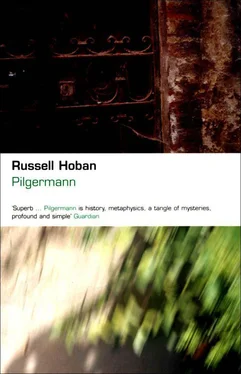Russell Hoban - Pilgermann
Здесь есть возможность читать онлайн «Russell Hoban - Pilgermann» весь текст электронной книги совершенно бесплатно (целиком полную версию без сокращений). В некоторых случаях можно слушать аудио, скачать через торрент в формате fb2 и присутствует краткое содержание. Год выпуска: 2002, Издательство: Bloomsbury Publishing PLC, Жанр: Современная проза, на английском языке. Описание произведения, (предисловие) а так же отзывы посетителей доступны на портале библиотеки ЛибКат.
- Название:Pilgermann
- Автор:
- Издательство:Bloomsbury Publishing PLC
- Жанр:
- Год:2002
- ISBN:нет данных
- Рейтинг книги:5 / 5. Голосов: 1
-
Избранное:Добавить в избранное
- Отзывы:
-
Ваша оценка:
- 100
- 1
- 2
- 3
- 4
- 5
Pilgermann: краткое содержание, описание и аннотация
Предлагаем к чтению аннотацию, описание, краткое содержание или предисловие (зависит от того, что написал сам автор книги «Pilgermann»). Если вы не нашли необходимую информацию о книге — напишите в комментариях, мы постараемся отыскать её.
Pilgermann — читать онлайн бесплатно полную книгу (весь текст) целиком
Ниже представлен текст книги, разбитый по страницам. Система сохранения места последней прочитанной страницы, позволяет с удобством читать онлайн бесплатно книгу «Pilgermann», без необходимости каждый раз заново искать на чём Вы остановились. Поставьте закладку, и сможете в любой момент перейти на страницу, на которой закончили чтение.
Интервал:
Закладка:
‘That’s right,’ he said. ‘In the diagrams one sees them point to point — the sulphur triangle with its hotness and dryness, the mercury triangle with its coldness and wetness. Look!’ He flung out his arm towards the sea where the sun-points danced. ‘The hot and dry is dancing on the cold and wet; in everything can we see these combinations working. These two triangles that we see in the diagrams, they want to mingle their natures as they did in that veiled story in which the cold and wet of Abraham’s water-nature was activated to neutralize the hot and dry of his fire-nature. Abraham, you know, is claimed by Jews and Arabs both. I myself believe that in this story he personifies the elemental complementarity that moves the universe. It is in the Holy Scriptures of your people that Abraham is first written of, and for this reason I want to avail myself of the action of your mind.’
‘How?’ I said.
‘There is a work that I have been thinking about for some time,’ he said. ‘I don’t want to talk about it quite yet.’
‘Are you an alchemist?’ I said.
‘You mean with pots and furnaces?’ he said.
‘Yes,’ I said.
‘No,’ he said. ‘That to me is greedy, it is a sweating after something to hold in the hand and look at, it is not a true giving, it is not an honest offering of the self to the Unity from which all multiplicity comes.’
‘But your two triangles,’ I said, ‘your sulphur-mercury process?’
‘Look!’ he said again. The crew were wearing the vessel round before the wind. The helmsman put the tiller over to bring the wind aft, the great triangle of the mainsail was let fly, the old windward shrouds were eased off and the new windward shrouds set up as we came about; the mainsail was sheeted home again and we filled away on the new tack. ‘Wind alchemy,’ said Bembel Rudzuk. ‘The triangle of the sail fills first on one side then on the other to drive us forward. Two triangles. My alchemy seeks no yellow metal; it is a continual offering to the Unity at the heart of the multiplicity. It makes no distinction between what is called something and what is called nothing, it knows such words to be without meaning.’ The sail swelled as if with the breath of God, the dhow pitched forward and reared back as if nodding in agreement with the words of Bembel Rudzuk, the sun-points danced on the water, the dark crew, some in white and some in faded colours, ranged themselves along the windward rail. I felt such a Nowness in the light of the day that Christ leapt into my mind like the visual echo of his unheard voice. ‘Ah!’ I said, ‘This, this, this!’ He was gone, there were only the sun-points on the water, the breath of God in the sail.
‘Yes,’ said Bembel Rudzuk, ‘you see!’
We made our way up the coast in short stages, calling at Tortosa, Marquiya, Baniyas, and Ladhiqiyya to discharge and take on a variety of cargoes. Each port in the changing lights of the day would grow smoothly and mysteriously larger and more detailed in the eye as we approached: first the massed groupings of light and shadow of the moored vessels, the low waterside buildings, the domes and minarets of the town behind; then the slow shifting of the grouped lights and shadows into separate and varied lights and shadows growing larger, more clear, becoming individually defined masts and sails and rigging, painted boats rocking at their moorings, figures aboard them standing and moving, faces looking across the green and sheltered, the shining and the shadowed water above which drifted the smells of cooking, the smoke of charcoal fires against a background of warehouse roofs and windows and open doors, cordage and tackle, bales, barrels, carts and wagons of the waterside. And always in front of this the motion of vessels arriving, vessels departing, and aboard these vessels faces passing, passing, locked in unknownness, growing smaller, becoming unseen.
Although our business in Ladhiqiyya was finished early in the evening we did not leave until much later; Suwaydiyya was only three or four hours away and Bembel Rudzuk wanted to arrive with the dawn rather than in the middle of the night. ‘Dawn is the best time for coming into port,’ he said, ‘and I always allow myself this pleasure when coming home.’
The feeble lamp-glimmers of the coast shifted subtly in our passing and were swallowed in obscurity. I looked up at the sky but the Virgin and the Lion were not to be seen, there were no stars, the night was opaque; this was already November and the rainy season. ‘Would the Virgin and the Lion be visible if the sky were clear?’ I asked Bembel Rudzuk.
‘No,’ he said, ‘they are below the horizon now.’
Towards morning it began to rain, and it was in the grey rainlight that Suwaydiyya offered to us the shapes of dawn all dark and huddled, the low waterside buildings curtained with rain, the water of the harbour leaping up in points to meet the downpour, the dawn boats rocking to the morning slap of the water on their sides, furled sails wet with dawn and rain and still heavy with night, crews sheltering under awnings, the smoke of their breakfast fires ghostly in the rain. And as always all of it, the whole picture in the eyes, had without seeming to come closer grown smoothly bigger in that particular way in which things reveal themselves when approached by sea, opening to the approacher more and more detail, more and more imminence of what is to come. And always, thus approaching, one feels the new day, the new place, coming forward to read the face of the approacher. Always the held breath, the questioning look of the grey morning, the seclusion of the rain.
On boarding Bembel Rudzuk’s dhow I had noticed the name painted on the bows in Arabic characters but I had not asked what that name was; I didn’t want to know. Having already been transferred from the Balena to Nineveh and having so far proclaimed nothing whatever on behalf of the Lord I preferred not to be aware of any further names of significance for a time; I wished if possible to be reabsorbed into the ordinary. But no sooner had we stepped ashore than I noticed again the Arabic characters painted on the bows, my mouth opened and was already asking Bembel Rudzuk what the name was before I could stop it.
‘Sophia,’ he said.
Horses were brought and we rode to Antioch, a dozen or so miles up the Orontes. The rain lessened into a dull brightness, that particular dull brightness that is always a little frightening in its blank revelation: one perceives that there is nowhere anything ordinary; there is only the extraordinary. It was from miles away that I first saw Mount Silpius and the many-towered walls ascending from the plain where stood the houses, domes, and minarets of Antioch on the River Orontes. Bigger and bigger in my eyes grew the mountain and the towered walls, the tawny towered walls and high up on the mountain the tawny citadel with its green-and-gold banner hanging motionless in the dull brightness. The mountain itself was browny purple, then blue-green tawny. Everything in that land was tawny either over or under whatever colour else it had. A lion-coloured land.
The mountain! Even a small mountain is always a surprise, it is always so much itself. The first sight of any mountain is the actuality of its strangeness. Let Mount Silpius stand for all strange mountains as it manifests itself in the grey light of morning, as it shows its purple shadows and its tawny dust darkened by the rain, as it shows its strangeness and its dread. That Moses was given the Tables of the Law on a mountain is significant: every mountain is the dreadful mountain of the Law, there move over it the thunder and the lightnings, there move on it the smoke and fire, there sounds from it the trumpet of the dreadful summons. The dread is that now is Now, that here is Here, that everything that is actually is, and everything is irrevocably moving.
Читать дальшеИнтервал:
Закладка:
Похожие книги на «Pilgermann»
Представляем Вашему вниманию похожие книги на «Pilgermann» списком для выбора. Мы отобрали схожую по названию и смыслу литературу в надежде предоставить читателям больше вариантов отыскать новые, интересные, ещё непрочитанные произведения.
Обсуждение, отзывы о книге «Pilgermann» и просто собственные мнения читателей. Оставьте ваши комментарии, напишите, что Вы думаете о произведении, его смысле или главных героях. Укажите что конкретно понравилось, а что нет, и почему Вы так считаете.












